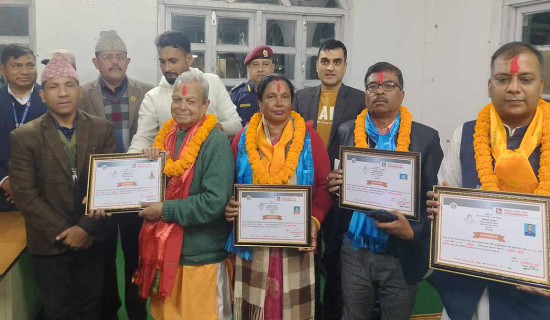- Sunday, 25 January 2026
Xi Jinping: On Development And Security
Chinese President Xi Jinping's The Governance of China, volume IV, offers a comprehensive overview of over 110 policy issues spanning 21 thematic areas. While these guidelines are specific to China, the interconnectedness of today's global landscape means their impact extends far beyond China's borders. As the world's second-largest economy, a major production hub, a significant source of tourism, and a key trading partner for over 120 countries, China's policies influence global markets and international relations. Additionally, China's role as a major development financer for the Global South and its initiatives—such as the Belt and Road Initiative, Global Development, Global Civilisation, and Global Security—underscore its substantial global impact.
China has also been playing a major role in global and regional organisations, advocating peace and common development and in the fight against global issues such as pandemics, the climate crisis, data and cyber security, and terrorism. China is Nepal’s friendly neighbour with thousands of years of relations, a major development partner, a key source of investment and tourism, and a trading partner. In such a context, the country needs to see the policy outlook of China and explore the beneficial opportunities.
Xi Jinping has divulged the various aspects of ‘Development and Security’ that China and the contemporary world are facing and provided guidelines to mitigate them in this volume. He links national security as an important key area to peace and prosperity and commands party leaders and the country to take into consideration the peace and development along with social and economic progress in the planning and disposition. He recalls the issue of coordinating development and national security as a guiding principle for economic and social development in the 14th Five-Year Plan (2021-2025) of China. President Xi’s most vitally important views on security and development can be underscored as the centrality of political or regime security, the illustration of internal and external security threats, emphasis on preventive approaches to security challenges, and a call for ongoing reforms in national security organisation, law, and policy to meet the increasingly security challenges that China is facing.
He enumerated 10 points on how to implement the holistic approach to national security that include to maintain ‘Central Committee’s centralised and unified leadership over national security; to put people at the center for national security; to create safe environment conducive to social and economic development through innovation; to ensure security of state power and political system; to promote global security for all, upholding the principles of cooperation, innovation and rule of law and win-win result, also contribute to the international endeavor to adopt and global vision for common, comprehensive, cooperative and sustainable security; to modernise national security system and enhance capacity and to strengthen national security teams and party leadership in the field with strong political commitment.
Recalling the response to the Corona virus pandemic, President Xi acclaims that the capacity of the central committee to conduct assessments, make correct decisions, and take action has played a key role at critical historical junctures. China, under the leadership of the communist party, has shown ability to mobilise resources and complete major missions by maintaining confidence in China’s socialist path, theory, and system, President Xi highlights.
He calls for strength and self-reliance in science and technology as the fundamental support for development. President Xi informs that science was applied in preventing and controlling the spread of the Corona virus and treating the disease to protect the people’s lives and health. As per President Xi, China has ensured the smooth functioning of industrial and supply chains through technological innovation and has made rapid break-throughs in core technologies to clear bottlenecks in order to ensure economic security and promote high-quality development.
President Xi considers food security a strategically important issue and calls for increased grain production and storage. President Xi commands that China’s firm land must stay above the red line of 120 million hectors and cautions to be mindful of the land as a scarce resource compared with the needs of 1.4 billion people.
President Xi commands to make sure that farmers get a return from their efforts. He calls for a need to stabilise and increase subsidies for grain producers, improve the minimum purchase price policy, and expand the scope of the insurance program to cover total production costs and incomes. Providing trainings to the farmers, fostering family farms and farmer's cooperatives, and extending those commercial services that are not feasible to handle by farmers were the measures identified to be addressed for motivating farmers. President Xi asks party secretaries and governors to take joint responsibility for the food security in their respective provinces. While lauding the important contributions made by the major grain-producing provinces, he announces the improved compensation mechanism for those who value agriculture and grain production. He cautioned officials to control risks while trading agriculture products and asked them to make a contingency plan with alternative products and solutions. President Xi acclaimed the progress in the fight against food waste and urges the Chinese society to continue this battle.
Many policies advocated by President Xi, such as to promote global security for all, upholding the principles of cooperation, innovation, and rule of law and win-win results, and a global vision for common, comprehensive, cooperative, and sustainable security, are highly relevant for Nepal. Considering security as a fundamental prerequisite for peace and development, the centrality of a unified command for national security and the use of technology and science-based approaches to handle the security challenges are equally relevant for our country. Almost all the policies on food security are pertinent to Nepal and can be applied after customising those policies as per the needs and conditions of the nation. Knowledge and information sharing, technology transfer, and capacity building in the areas of security and development can be the subject matters of mutual interest that Nepal and China can work together for security, peace, and development in the trans-Himalayan region.
(The author is a former Nepali Ambassador to China.)
















